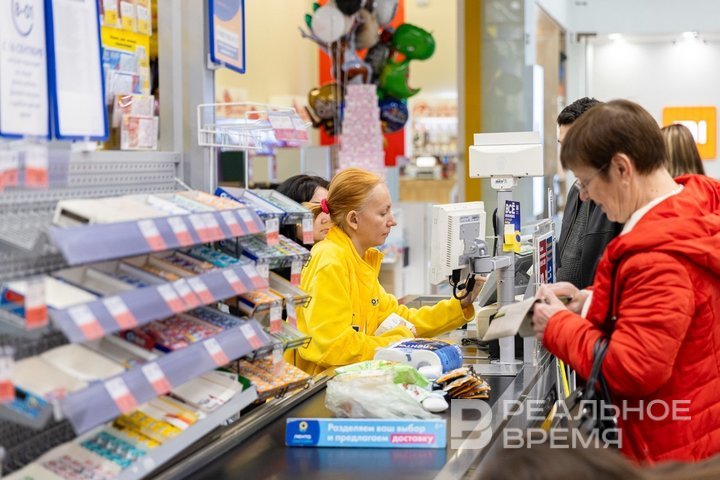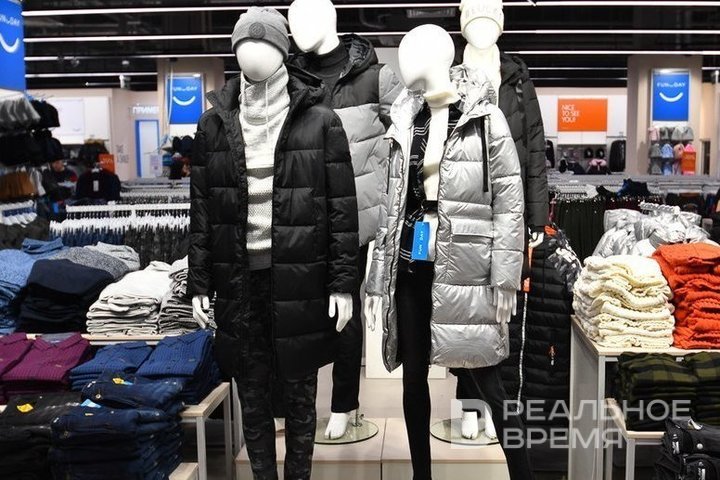Microbusinesses in Tatarstan requesting cancellation of mandatory product labelling requirements

Tatarstan businesses are trying to slow down the introduction of mandatory labelling of new types of clothing from March 1, 2025, making an exception for microenterprises. To this end, a delegation of entrepreneurs from the republic is going to a conference in St. Petersburg, where they will present the results of the Moscow State University study on the impact of the labelling system on SMEs in the light industry. Read more about the problems that concern merchants in connection with the transition to digital codes in the material of Realnoe Vremya.
“Labelling in its current form is not suitable for us”
Yulia Samoilova, the co-chair of the Tatarstan association Business in Danger, told Realnoe Vremya about the difficulties and losses suffered by small businesses in connection with the introduction of mandatory labelling. She recalled that microenterprises operating in the trade have already had difficulties applying the Data Matrix code to shoes and clothing. She said that entrepreneurs had raised this issue, but it turned out to be impossible to solve the problems caused by changes in federal legislation at the local level.

The interlocutor of the publication emphasised: microenterprises work with small batches of goods, they buy them mainly from wholesalers in legal wholesale Moscow markets. Often, according to her, they are faced with that there is a label on the product, but it is missing in the electronic document circulation (EDO), and it is no longer possible to put it there.
If the chain of “manufacturer — intermediary — seller” is interrupted, it is not traceable, then it will be impossible to sell such goods under the conditions of mandatory labelling requirements. Usually, according to the entrepreneur, this happens with imported goods, of which about 80% are on the market. She claims that it is impossible to work exclusively with Russian manufacturers whose system works flawlessly because there are too few of them.

Tatarstan entrepreneurs are particularly concerned about the requirement to label remaining stock — adding information to the electronic document management system (EDO) for goods previously purchased from wholesalers:
“An entrepreneur is under threat of triggering risk indicators through no fault of his own”
The regional public organisation Assistance To Small Businesses tried to approach these problems scientifically and objectively, to evaluate the results of the introduction of mandatory labelling.
“Since February 2020, the phased labelling of light industry products and remnants of goods has begun, and today, as a result of the application of mandatory labelling of light industry goods, a catastrophic situation has developed for SME entrepreneurs," the press service of the Assistance To Small Businesses NGO told Realnoe Vremya. “Due to the identification of numerous errors and failures in the operation of the Chestniy Znak (Honest Sign) system, the entrepreneur is under constant threat of triggering risk indicators through no fault of his own and may at any time be subjected to administrative and criminal liability for lack of labelling.”
The organisation says that many entrepreneurs were unable to successfully go through the labelling process of the first and second wave residues due to the complexity of the system program, and found themselves in a very difficult situation with a significant number of unmarked product residues. At the same time, there is no longer a legitimate opportunity to label the remaining inventory. Currently, the third wave of labeling includes the largest volumes of light industry products: T-shirts, underwear, hosiery, mittens, gloves, swimsuits, hats, infant products (sliders, vests, bonnets, booties). And according to the existing rules, labelling these categories is physically impossible in the allotted time due to the huge range of remaining inventory and the size of this type of product, the organisation emphasised.

“By introducing mandatory labelling of goods with accounting information stamps according to the Chestny Znak system, business entities are burdened with additional costs, expenses and other expenses, therefore, the declared price of a stamp of 60 kopecks per unit of goods increases by a multiple and increases the cost of goods by 10-40 percent," Assistance To Small Businessws NGO told the publication.
“As a result, the share of small businesses in the industry will decrease”
The result of the Lomonosov Moscow State University study “Predictive assessment of the impact of the mandatory labeling system on the economic and social components of the activities of small and medium-sized businesses in the Russian light industry” was a number of conclusions (the document is available to the editorial staff). Realnoe Vremya presents them with minor edits:
- in Russia, prices for light industry goods are significantly higher than the global average because the production cost of textile products is substantially increased due to unfavourable business conditions, such as (a) the current refinancing rate, which dictates stagnation trends in the sector, and (b) mandatory product labelling implemented without regard to the interests of the light industry sector. Further price increases in textiles could lead to a depressive trend in many areas of small and medium-sized businesses (SMEs).
- public-private partnership in the field of mandatory labelling of goods does not formally involve granting specific commercial organisations the authority to certify products for labelling at the expense of manufacturers and sellers;

- current Russian rules for labelling light industry goods do not provide for the separation of market participants by format, size and type of business, so OZON, a small retail store and a small garment production, are on the same page, which is becoming a source of problems for many SMEs and a tool for monopolising the market by large businesses;
- new product labelling requirements will lead to that a large number of small and medium-sized enterprises in the field of light industry will face economic difficulties, which will eventually affect their financial situation and prospects for working in the commodity markets.;
- criminalisation of violations of the rules of mandatory labelling of goods in the Russian light industry is questionable in the context of a broad understanding of the principle of legality and should be checked within the framework of the constitutional control system. The prospects of criminal liability for entrepreneurs due to the monopoly (CRPT) setting requirements for product labelling-enforceable only under conditions dictated by the monopoly are highly likely to contribute to bankruptcies, criminal behaviour in the market, and the growth of the shadow sector in light industry and goods trade.
- main problematic aspect of the Chestny Znak system in relation to textiles has become the introduction of digital labelling of goods, which refers to formal control methods and, starting from the production stage, does not indicate the level of product quality, its composition and rules for the care of things, that is, the system does not take into account the interests of not only manufacturers and merchants, but also consumers of the garment industry;

- digital labelling of goods is a technical tool that cannot control compliance with legislation on the protection of the interests of intellectual property rights holders, therefore, in relation to light industry, no effect is expected in this matter. At the same time, ordinary consumers of retail goods need to have a smartphone to download the Chestny Znak app and access the Internet to check product labelling, and they still won't learn anything meaningful about textiles from Chestny Znak, and most consumers in Russia cannot cope with this task;
- unplanned additional costs of SMEs for the organisation of labelling activities are associated with labour costs for training or hiring employees, the purchase of equipment and the digital brand itself, and the organisation of the technological process are likely to violate the constitutional rights of entrepreneurs (Article 34 of the Constitution of the Russian Federation);
- labelling of goods in light industry requires the investment of significant resources and the expenditure of assets of enterprises: financial, labour, technical. And business entities have critical problems with electronic document management when interacting with the Chestny Znak system, which often incorrectly or does not display information provided by SMEs at all;
- digital labelling of light industry goods is unlikely to lead to an actual increase in tax revenues for the budget system. At the same time, the digital textile labelling system in its current form will lead to a significant increase in prices;

- A critical problem has arisen for representatives of small businesses due to the emergence of new costs for the purchase and maintenance of marking control devices (scanners) and communication channels, and in the case of the sale of several groups of goods, for example, textiles and fur products, different devices and software are needed;
- Small businesses in the textile industry and retail trade do not have sufficient financial resources to cover the costs associated with labelling goods. As a result, the share of small businesses in the industry will further decrease, and the strategic goal set in the national project Small and Medium-sized Entrepreneurship to increase the share of small businesses will not be achieved.
The report also states that “the results of the study were prepared by the Centre for Industrial Economics of the Federal State Budgetary Institution Scientific Research Financial Institute of the Ministry of Finance of the Russian Federation on behalf of the Association of Manufacturers of Branded Trademarks RUSBRAND.
“The issue is controversial”
Realnoe Vremya asked the press service of the Centre for the Development of Advanced Technologies (the operator of the Chestny Znak state labelling system) to clarify whether the consequences of labelling for the microbusinesses have been assessed, what are the results of this assessment, and whether it is possible to meet the microbusiness halfway in terms of eliminating the requirement to label goods. Upon receipt, the response will be published.
After the publication reached out to the operator of the national product labeling system, Chestny Znak, one of the authors of the study, “Forecast Assessment of the Impact of the Mandatory Product Labeling System on the Economic and Social Components of Small and Medium Business Activities in the Russian Light Industry”, Alexey Andreyev, an associate professor at the Department of Global Social Processes and Youth Work of the Faculty of Global Processes at Lomonosov Moscow State University, contacted the editorial team. . He said that “this study was done by a small group of experts from different universities, including scientists from Moscow University” for the Assistance to Small Businesses NGO and was based on materials provided by the organisation that commissioned it.
According to Andreyev, the results of this study were received by the ROO in the autumn of 2024. After that, at the initiative of the scientists, additional scientific work was conducted using updated data.
“The study was carried out for the needs of this public organisation in order for this organisation to better prove its position in communication with government authorities. We have received new data during this time, because the study was conducted last year. And now the research position has changed…"
Andreev explained the reason why he and his colleagues decided to conduct a new study by saying that the issue of labelling's impact on business is “resonant and requires greater scientific objectivity and care.” When asked by Realnoe Vremya whether the new version of the study will be presented to customers who paid for the previous work of scientists, and if so, when it will happen, Andreev replied: “The updated report will be provided approximately on the 23rd, at the time of the presentation.”
“They are right, but they will not meet them halfway”
Shamil Ageev, the chairman of the Board of the Chamber of Commerce and Industry of the Republic of Tatarstan, is also aware of the troubles that have befallen small traders in connection with the introduction of mandatory labelling. He confirmed that labelling is an expensive pleasure for microbusiness, which customers will eventually pay for. He added that he does not see any prospects for the initiative to abolish labelling for a certain range of enterprises:
